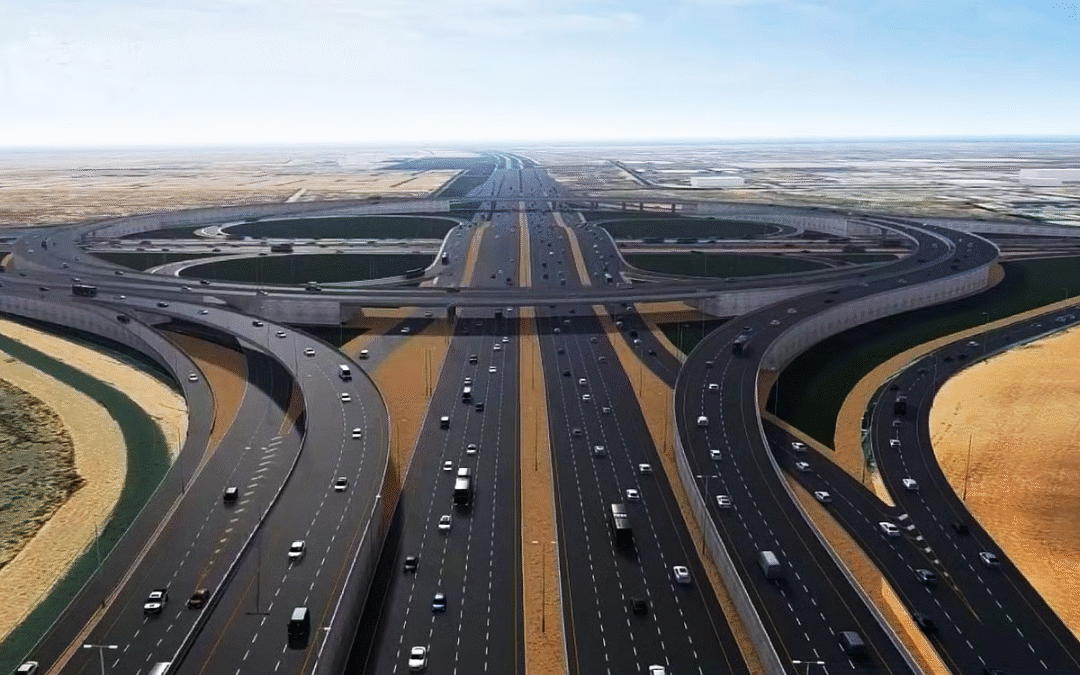The UAE government has announced a major infrastructure upgrade — a Dh750 million Emirates Road (E611) expansion project aimed at reducing congestion and improving connectivity across the northern emirates.
The project, managed by the Ministry of Energy and Infrastructure (MoEI), will begin in September 2025 and take around two years to complete. It represents one of the UAE’s most significant road investments in recent years.
Key Highlights of the Emirates Road Expansion
Road widening: Expanding from three to five lanes in each direction across 25 km, between Al Badee Interchange in Sharjah and the Umm Al Quwain border.
Increased capacity: Designed to handle 9,000 vehicles per hour, a 65% boost in traffic capacity.
Interchange upgrade: Interchange No. 7 will include six directional bridges (12.6 km total) with a capacity of 13,200 vehicles per hour.
Collector/service roads: 3.4 km of new collector roads will be added on both sides of the main carriageway.
Reduced travel times: Travel times between Ras Al Khaimah, Umm Al Quwain, Sharjah, and Dubai are expected to drop by up to 45%.
Why the Project Matters
1. Reduced Traffic Congestion
Emirates Road is one of the busiest highways in the UAE. The expansion will ease daily congestion, improve safety, and ensure smoother commutes for residents and logistics operators.
2. Better Inter-Emirate Connectivity
Enhanced road capacity will improve the flow of goods and services between the northern emirates and Dubai, supporting business growth, trade, and tourism.
3. Environmental Benefits
Reducing stop-and-go traffic will help lower carbon emissions and fuel consumption, aligning with the UAE’s sustainability goals.
4. Improved Quality of Life
Shorter commutes and less time spent in traffic will enhance overall productivity and reduce stress for residents and commuters.
Budget Clarification
Earlier reports mentioned a Dh240 million budget, but the official and confirmed figure is Dh750 million, according to the Ministry of Energy and Infrastructure and verified UAE news sources. The increased budget reflects the project’s scale and long-term importance.
What to Expect During Construction
- Construction will be phased over two years, with measures to manage traffic flow and minimize disruptions.
- Commuters may face temporary diversions or slower traffic in some sections.
- Authorities will closely monitor performance to ensure the project’s promised travel-time reductions are achieved.
Impact on Real Estate and Economic Growth
1. Northern Emirates Become More Attractive
Improved connectivity between Dubai, Sharjah, Ajman, Umm Al Quwain, and Ras Al Khaimah will boost residential and investment appeal. Affordable housing areas will benefit most as commute times drop by nearly half.
2. Surge in Affordable Housing Developments
Developers are expected to respond with new mid-income housing projects along Emirates Road, especially in Sharjah and Ajman, where demand for affordable homes is already high.
3. Growth in Industrial and Commercial Real Estate
Enhanced logistics access will support warehouses, industrial zones, and distribution hubs between Sharjah and Umm Al Quwain, making the corridor a hotspot for commercial growth.
4. Increase in Land and Property Values
Improved access points and interchange upgrades will likely drive land appreciation along Emirates Road, encouraging new mixed-use and residential developments.
5. Boost for Dubai’s Suburban Communities
Developments such as Dubai South, Emaar South, Arabian Ranches 3, and DAMAC Hills 2 will become even more desirable, with faster routes into central Dubai.
6. Tourism and Holiday Homes on the Rise
Smoother access to Ras Al Khaimah will increase tourism and hospitality activity. Expect higher demand for holiday homes, serviced apartments, and resorts as more Dubai residents explore weekend travel options.
Final Takeaway
The Emirates Road expansion project represents more than just improved transport — it’s a strategic move toward smarter urban growth and economic development.
With a Dh750 million investment, the UAE is paving the way for faster commutes, safer travel, and stronger links between emirates.
For commuters, businesses, and investors alike, the project is set to transform accessibility, enhance real estate potential, and support long-term national growth.

